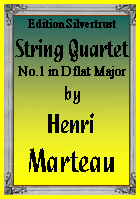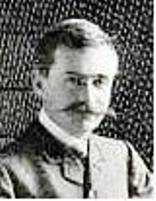Presents
Henri Marteau
 |
 |
Soundbites courtesy of Steve Jones |
String Quartet No.1 in D flat Major, Op.5
Henri Marteau (1874-1934) was born in the French city of Reims. It was said that as a boy of 5, he was presented with a toy violin by Paganiniís only student, the virtuoso Sivori. He took private lessons from Hubert Leonard, head of the violin department at the Paris Conservatory and soon became one of the leading soloists of his time. Later he taught at the Geneva Conservatory and was appointed as Joseph Joachimís successor at the Hochschule for Musik in Berlin. Besides his solo work, Marteau was a strong advocate of chamber music, frequently taking part in chamber music concerts and a great number of his compositions are for chamber ensembles. He was friends with many of the leading personalities of his time, including Brahms, Reger and many others.
Marteau's String Quartet No.1 in D flat Major, Op.5 dates from 1904 and is in three movements. The big opening movement, Molto moderato, has many attractive themes beginning with the main subject first given out by the cello. The development and introduction of subsequent themes are also original and interesting. The middle movement, Allegro giocoso, ma non troppo, opens sounding rather like Paul Dukas. The main theme is more rhythmic than melodic and somewhat strident. There is a lovely side theme which provides strong contrast. The bridge passages contain several energetic runs. The finale is longer than the first two movements together. Titled Introduction et Rondo, it begins with substantial introduction at aslow tempo, sounding lugubrious and slightly downcast. This introduction is in truth too long to be treated as an introduction and instead must be considered a slow movement welded to a faster concluding movement. It is very effective. The main theme of the Allegro is closely related to that of the Introduction. As such, it too is slightly melancholy. The tempo for the most part is closer to an allegretto. The coda appears in canonic fashion. This quartet has many attractive features and deserves concert performance.
This is a work which can be recommended for concert and to experienced amateur players of good ability. Out of print for more than half a century, we are very pleased to make it available once again and hope that players will give it a chance.
Parts: $24.95
Parts & Score: $33.95